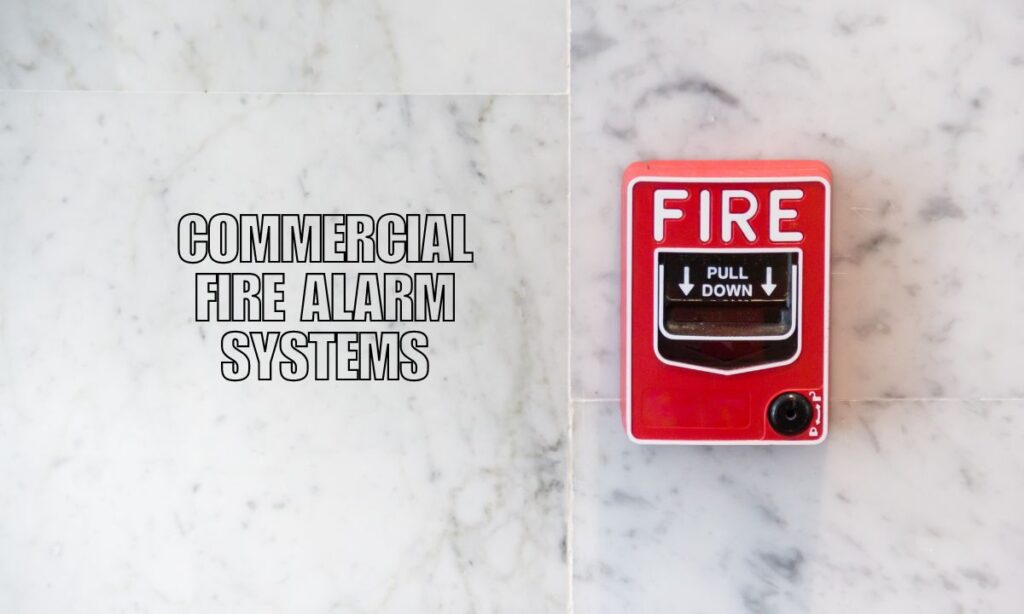A commercial fire alarm system is a safety mechanism designed to detect fires, alert building occupants, and notify emergency personnel. It consists of various components such as smoke detectors, heat sensors, alarm triggers, and control panels that work together to ensure early fire detection and rapid response.
Fire alarm systems are critical in commercial buildings, ensuring the safety of employees, customers, and assets. These systems function through four primary operations:
- Detection – Identifying the presence of smoke, heat, or fire.
- Alerting – Sounding alarms and visual signals to notify occupants.
- Monitoring – Continuously assessing system functionality.
- Control – Activating suppression systems like sprinklers.
Key Takeaways:
- Commercial fire alarm systems protect lives and property.
- They include various components such as smoke detectors, alarm triggers, and control panels.
- Two main types: Conventional and Addressable fire alarm systems.
- Proper maintenance ensures optimal functionality and compliance with safety regulations.
- These systems can integrate with emergency notification and sprinkler systems for enhanced safety.

How Commercial Fire Alarm Systems Work
Detection: The First Line of Defense
Fire alarm systems detect threats using:
- Smoke Detectors – Identify airborne particulates from combustion.
- Heat Sensors – Detect rapid temperature changes.
- Carbon Monoxide Detectors – Sense toxic gas accumulation.
- Manual Pull Stations – Allow manual activation during emergencies.
Alerting Occupants and Emergency Responders
Once a fire is detected, the system activates alarms through:
- Audible Alerts – Sirens, bells, or voice announcements.
- Visual Signals – Flashing strobe lights for individuals with hearing impairments.
- Remote Monitoring – Sends alerts to fire departments and security teams.
Monitoring System Health
Modern fire alarm systems self-monitor to detect malfunctions in:
- Wiring connections
- Power supply
- Detector performance
- Control panel functionality
Fire Suppression and Control Mechanisms
Many commercial fire alarms are integrated with:
- Sprinkler Systems – Activate upon detecting fire.
- Fire Extinguishers – Placed strategically for manual fire suppression.
- Emergency Lighting – Guides occupants to safety during power failures.
What Are the 5 Types of Commercial Fire Alarm Systems?
There are five main types of commercial fire alarm systems, each serving different needs:
- Conventional Fire Alarm Systems – Use zoned panels to monitor specific building sections.
- Addressable Fire Alarm Systems – Assign unique addresses to each device for pinpointing issues.
- Wireless Fire Alarm Systems – Utilize radio signals instead of wiring for flexibility.
- Hybrid Fire Alarm Systems – Combine wired and wireless technology for enhanced coverage.
- Voice Evacuation Fire Alarm Systems – Provide verbal instructions to guide safe evacuations.
Legal Responsibilities and Requirements
Are Commercial Landlords Responsible for Fire Alarms?
In most cases, commercial landlords are responsible for installing and maintaining fire alarm systems, ensuring compliance with local fire codes and regulations. However, tenants may also have obligations, such as regular testing and reporting system malfunctions.
Are Fire Alarms Required in Commercial Buildings?
Yes, fire alarm systems are legally required in most commercial buildings. Regulations vary by jurisdiction, but high-occupancy buildings, those storing hazardous materials, and properties with overnight stays typically require robust fire alarm systems.
Do Commercial Buildings Need Fire Alarms?
Absolutely. Fire alarms are essential for ensuring safety, mitigating fire-related risks, and reducing property damage. They also help businesses comply with insurance requirements and fire safety laws.
Do You Need a Fire Alarm in a Commercial Property?
Yes, every commercial property should have a properly installed and maintained fire alarm system to protect employees, customers, and assets.
Maintenance and Testing
How Often Should Commercial Fire Alarms Be Tested?
Fire alarm systems should be:
- Tested monthly for functionality.
- Inspected professionally at least once a year to ensure compliance with NFPA (National Fire Protection Association) standards.
How to Install Commercial Fire Alarm Systems
Installation involves:
- Planning and Compliance Check – Ensuring adherence to fire codes.
- Wiring and Component Installation – Setting up detectors, alarms, and control panels.
- Integration with Other Safety Systems – Connecting sprinklers and emergency lights.
- Testing and Certification – Conducting trials to verify functionality before operation.
How to Reset a Commercial Fire Alarm
To reset a fire alarm system:
- Locate the fire alarm control panel.
- Enter the authorized access code.
- Press the reset button.
- Verify system status and ensure all alerts clear.
How to Turn Off a Commercial Fire Alarm
Only turn off a fire alarm after confirming there is no fire:
- Silence the alarm from the control panel.
- Disable the affected zone if necessary.
- Reactivate the system to maintain safety compliance.
When Is a Fire Alarm Required in a Commercial Building?
Fire alarm requirements depend on:
- Building occupancy – Higher occupancy buildings require stricter fire safety measures.
- Business type – Industrial and hazardous material storage facilities have stricter mandates.
- Local fire codes – Regulations vary, but most require alarms in commercial spaces.
Benefits of a Commercial Fire Alarm System
- Early Detection – Reduces fire damage and enhances safety.
- Fast Response Time – Alerts emergency services automatically.
- Regulatory Compliance – Meets legal requirements for fire safety.
- Lower Insurance Costs – Many insurers offer discounts for monitored fire alarms.
Additional Information About Commercial Fire Alarm Systems
- Integration with Smart Building Systems – Fire alarms can connect with IoT devices for enhanced monitoring.
- Battery Backup Ensures Reliability – Keeps systems operational during power outages.
- Regular Testing is Required – Fire codes mandate periodic inspections.
- Wireless Fire Alarm Systems are Growing – These offer scalability and reduce installation costs.
FAQs About Commercial Fire Alarm Systems
How often should fire alarms be inspected?
Commercial fire alarms should be tested monthly and inspected by professionals annually to ensure compliance with NFPA (National Fire Protection Association) standards.
Do all businesses need a fire alarm system?
Most commercial buildings are required by law to have fire alarm systems, especially those with high occupancy, hazardous materials, or overnight stays.
What happens if a fire alarm malfunctions?
Most modern systems have self-diagnostic features to detect faults and send alerts to maintenance teams. Regular inspections prevent unexpected failures.
Can fire alarms reduce insurance costs?
Yes! Many insurance providers offer discounts for businesses with monitored fire alarm systems, reducing premiums due to lower risk.
Why Every Business Needs a Commercial Fire Alarm System
A commercial fire alarm system is more than just a safety requirement—it’s a lifesaving investment. From early detection to automated alerts, these systems ensure that fires are handled swiftly, minimizing risks to lives and property. Staying compliant, performing regular maintenance, and choosing the right system can make all the difference in keeping businesses and people safe.
For professional commercial fire alarm system installation, maintenance, and consultation, get in touch with Callaway Security™. Our experienced team is dedicated to providing top-notch fire protection solutions tailored to your specific needs. Contact us today for more information!












